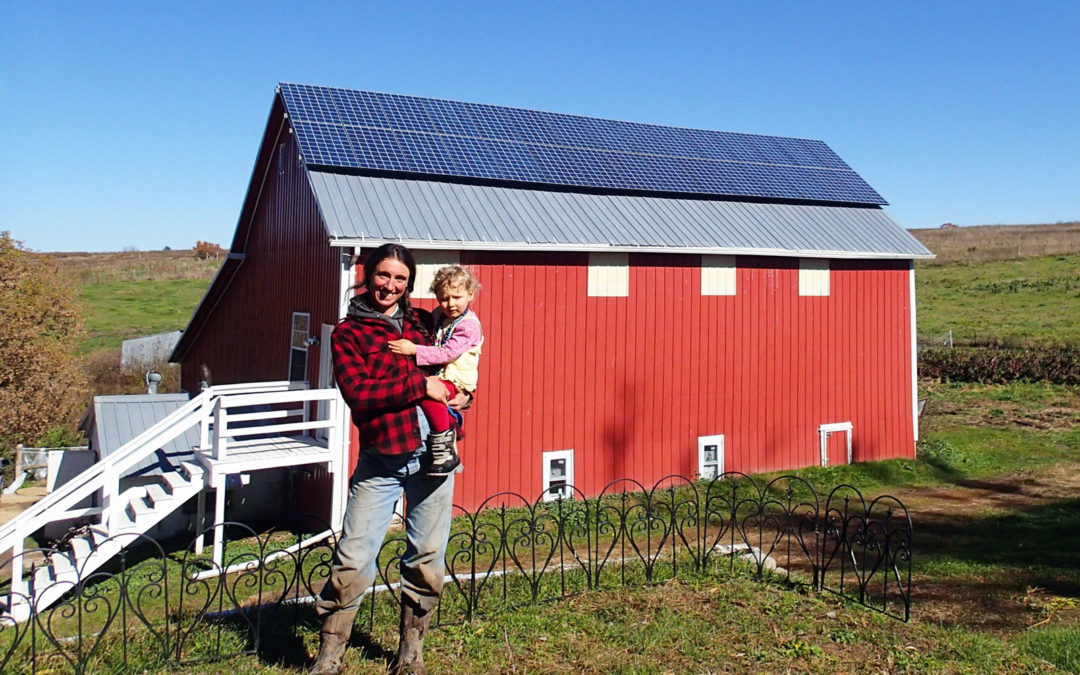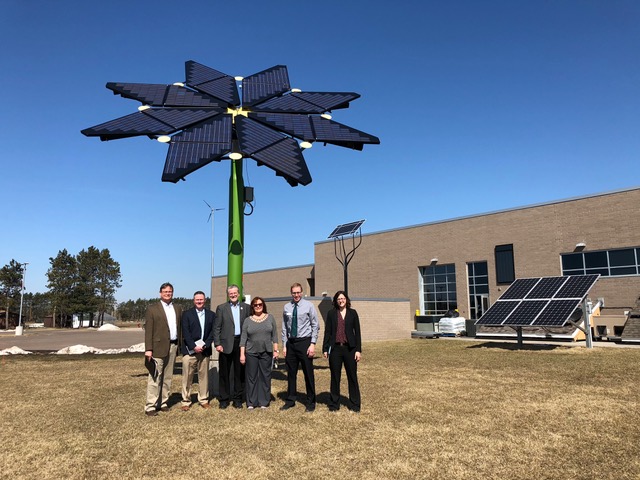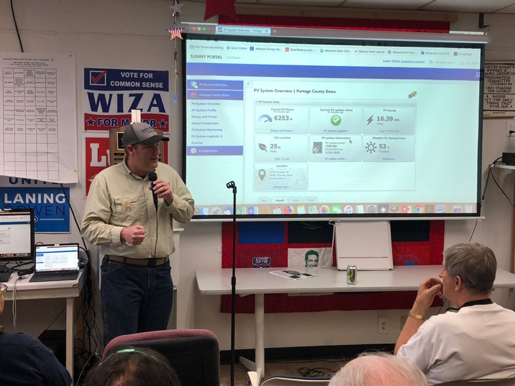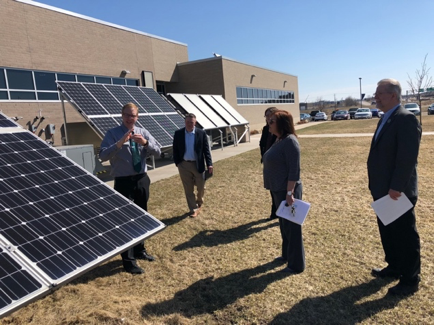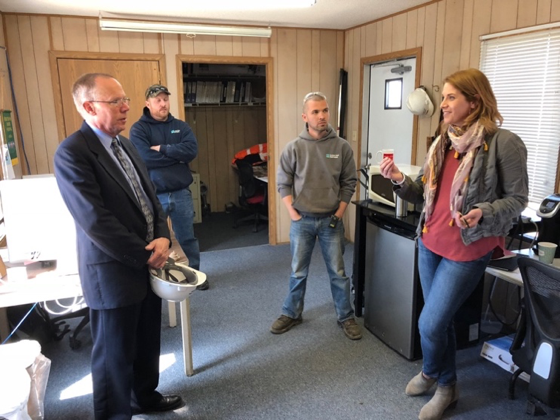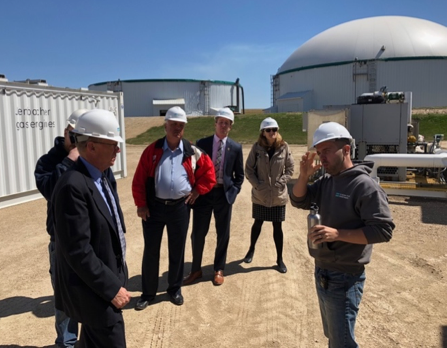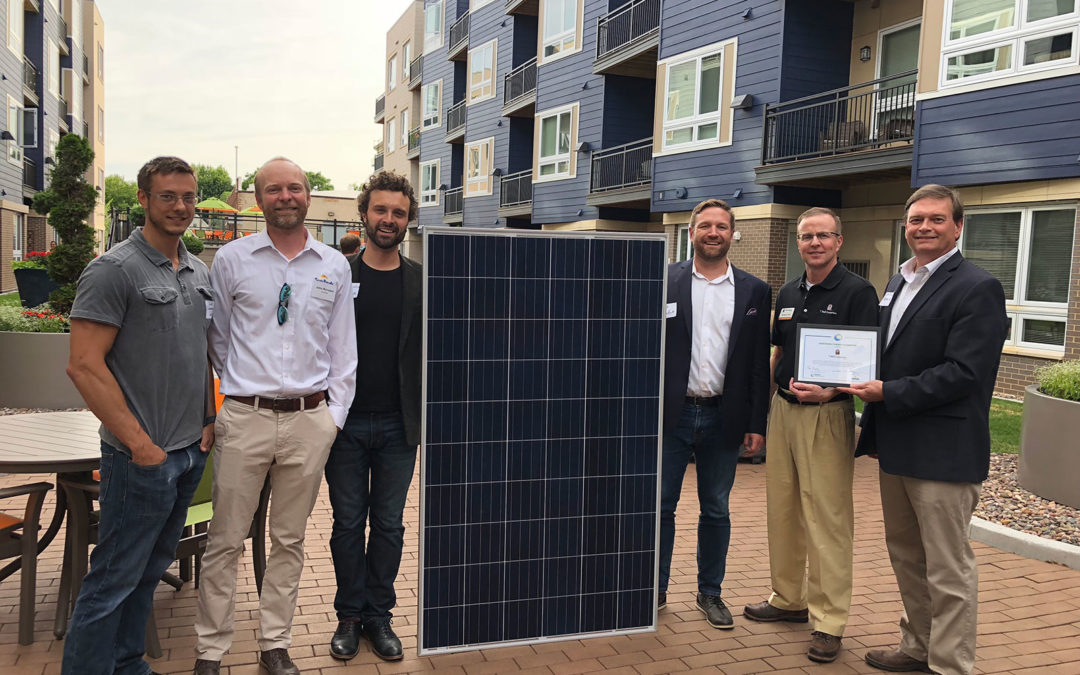
by Jim Boullion | Jun 28, 2018 | Biogas, Solar
Puerto Rico Learns about Renewable Energy in Madison
On May 29th Madison Mayor Paul Soglin asked RENEW Wisconsin to join him and his staff to meet with Bernardo Márquez Garcia, Mayor of Toa Baja, Puerto Rico, as they discussed some of the renewable energy initiatives that Madison has in place and ways that cities in Puerto Rico might use renewable energy to help reestablish electric service and make it more reliable.
“That is so important because in the remote areas of the island and so many critical areas of the city there is a need when the hurricane strikes, when the power system goes down, to have electric power,” Soglin said.
Bubolz Nature Preserve Unveils Off-Grid Microgrid
On May 31st I was very excited to head to Appleton where Faith Technologies, in partnership with Schneider Electric, unveiled the state-of-the-art, clean energy microgrid they designed and built at the Gordon Bubolz Nature Preserve in Appleton.
As one of the keynote speakers at the event, Senator Roger Roth praised the project and the Bubolz Nature Preserve for the great work they do. Many other local officials were on hand to learn more about the project including Senator Rob Cowles, Representative Mike Rohrkaste and Outagamie County Executive Tom Nelson.
As one of the most advanced microgrids in existence, the Gordon Bubolz Nature Preserve project acts as a testing and demonstration site for increasingly sophisticated microgrid operations, showing how advanced controls and operation optimization combined with state of the art technology can work together to provide clean, reliable power.
The advanced microgrid uses a 200-kW solar photovoltaic array; C-Series Proton On Site Hydrogen Generator; 30-kW hydrogen fuel cell; a 100-kW Tesla lithium-ion battery storage system; a 65-kW micro-turbine; and a 60-kW Kohler natural gas generator. Together they allow the system to completely disconnect from the utility grid and still operate the 18,000-square-foot nature center building, with power to spare!
Crave Brothers Open House
On June 13th I visited the Crave Brothers Dairy Farm in Waterloo for a very well attended Green Energy Showcase event designed to educate the public and government officials about their unique operation that integrates raising crops, a dairy farm, cheese making operation and a biodigester system.
Attending the event were Wisconsin DATCAP Secretary Sheila Harsdorf, State legislative staff and U.S. Deputy Secretary of Agriculture Steve Censky. While addressing the crowd, Censky praised the Crave Brothers operation, “There are many wonderful innovations happening in agriculture,” he said, “This is just one example of those projects.”
The two 750,000-gallon biodigester tanks located on the farm process manure from 2,600 cows. Other organic byproducts, such as cheese whey and food waste, also go into the biodigester, producing enough methane to generate 633 kilowatts of electricity from the adjacent generator, enough electricity to power the farm, the cheese factory and more than 300 homes in the Waterloo area.
T-Wall Enterprises Leading the Way on Multi-Family Solar
On June 14th RENEW Wisconsin recognized T-Wall Enterprises with a “Renewable Energy Champion” award for their support of renewable energy. T-Wall worked with SunPeak to install solar arrays on four of its multifamily properties —Veritas Village, Tribeca 1, Tribeca 3 and Wingra Point — for a total of 431 kW of onsite solar generation. As of June 2018, T-Wall Enterprises has put in place more solar capacity than any other developer of multifamily dwellings active in Wisconsin.
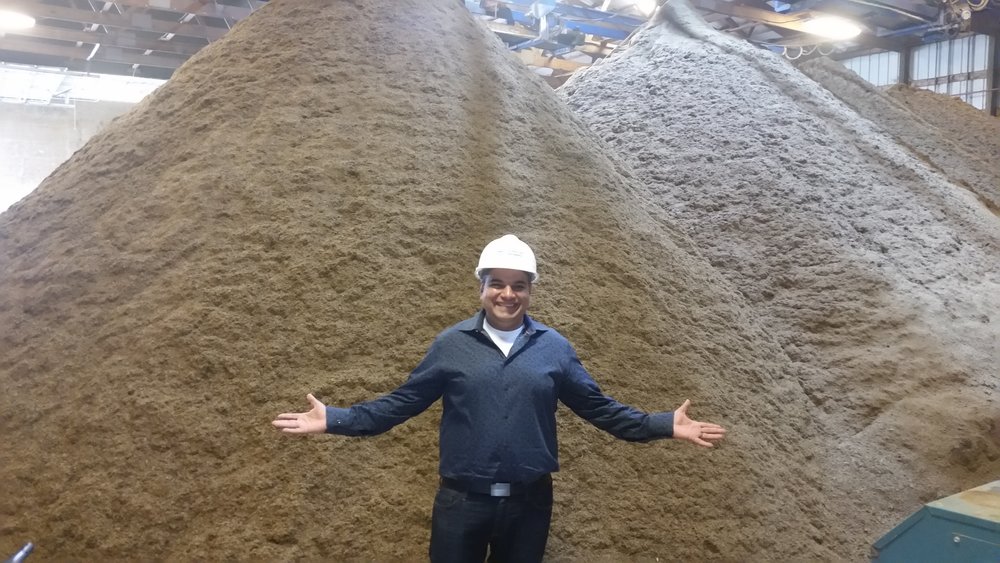
by Michael Vickerman | May 21, 2018 | Biogas, Local Initiatives
In early April, Yogesh Chawla was elected to Dane County Board of Supervisors, representing portions of Madison’s East Side and the Town of Blooming Grove. Less than a month following his election, Supervisor Chawla toured a biodigester facility in the Town of Vienna near Waunakee along with Dane County Executive Joe Parisi and his staff. Clean Fuel Partners, a RENEW business member, owns and operates the seven-year-old facility, which was the first farm-based community biodigester project designed and built in Wisconsin. Dane County took the lead in developing that project, and followed that up with another in the Town of Springfield.
Dane County’s substantial investments in farm waste-derived biogas is the centerpiece of a broader strategy to support local dairy farms and healthy lakes. The biodigester system that Chawla visited reduces the volume of phosphorus runoff into its lakes as well as displaces fossil fuel use with a local renewable energy source. From his appointments to the Environment, Agriculture and Natural Resources standing committee and the Land Conservation Committee, Supervisor Chawla is well-positioned to guide Dane County’s future efforts to clean up its lakes and farmlands through methane capture.
Read more about Yogesh Chawla’s tour HERE.
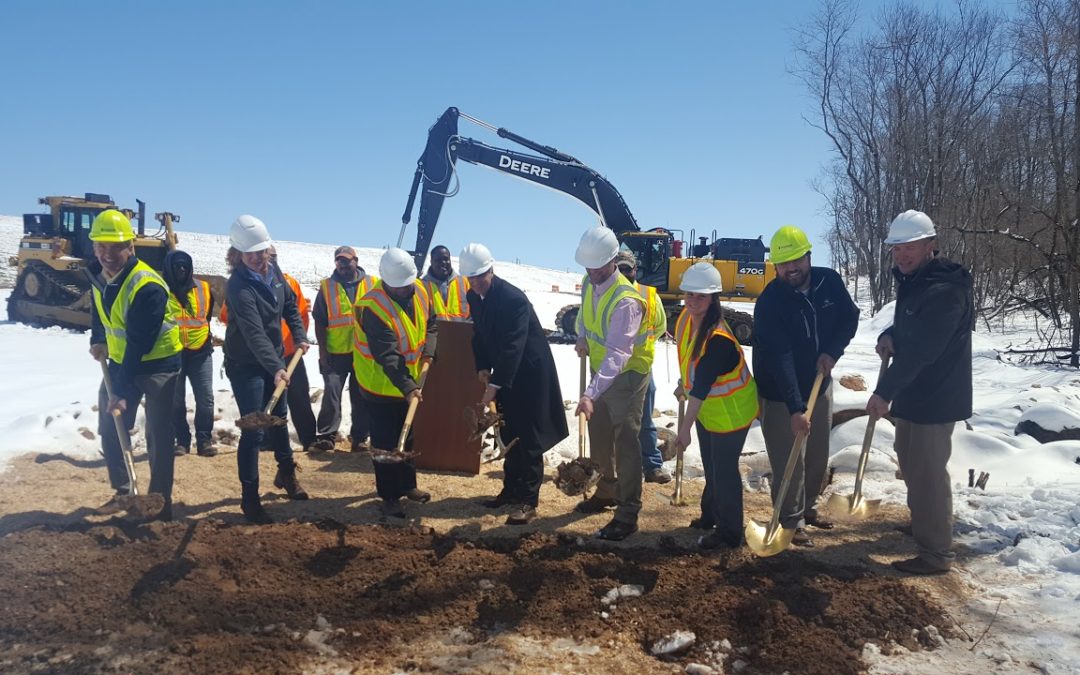
by Michael Vickerman | Apr 20, 2018 | Biogas, Renewables, Solar, Wind
In the spirit of leading by example, Dane County launched two separate and distinct initiatives this week to power its own operations with clean energy resources. One initiative involves becoming a co-investor in solar and wind projects that will supply Dane County offices with zero-emission electricity. The County will issue a Request for Proposals in early May.
The other project, with an estimated price tag of $25 million, will clean up the methane coming from the Yahara landfill and several local dairy farms and convert it into compressed methane fuel for the County’s vehicle fleet. RENEW member businesses BioFerm and Clean Fuel Partners are part of the team of contractors developing this project. Construction of the project will commence this spring, and should wrap up in the first half of 2019.
County Executive Joe Parisi circulated an email summarizing the renewable energy initiatives detailed below.
Good morning,
As we approach Earth Day this weekend, it is my pleasure to share with you exciting news of two projects that continue to make Dane County a leader in renewable energy in Wisconsin.
This week I announced that Dane County will seek partners in the coming weeks to help develop new solar and wind farms across Wisconsin. It’s our latest investment in clean, renewable energy in an effort to improve efficiency and reduce climate change causing emissions. The county will release a request for proposals, seeking offers from prospective solar and wind developers on projects Dane County could become an investor in. Projects will be evaluated this summer, with recommendations made in time for 2019 budget preparations. The goal is to facilitate the development of projects that generate renewable electricity to offset the amount of energy used to run county operations. In turn, keeping with the county’s benchmark of being 100% sustainable.
And yesterday, I helped kick off construction for an innovative project that will turn garbage and cow manure into renewable fuel for thousands of vehicles across the region and country. This project is also expected to significantly increase our lakes clean-up efforts by increasing revenue opportunities for local biogas digesters. Taking cow manure and garbage and turning it into vehicle fuel is good for the air we breathe, the waters we fish and swim in, and county taxpayers. We are committed to accelerating work to clean up our lakes and financing efforts to produce renewable energy, and this project does both.
Design work of the new facility is complete and the remainder of the project is out for bid now. Construction is expected to begin in the coming weeks with the system online by spring of 2019. This project is the first in the nation to be able to receive biogas from multiple off-site locations and connect that renewable gas with CNG gas stations locally and across the nation.
For more information, please see the full releases below and the links to the media stories:
Renewable Proposals: http://host.madison.com/wsj/news/local/govt-and-politics/dane-county-to-seek-proposals-for-funding-private-renewable-energy/article_87ca0f31-9879-57fa-bc8e-4fca47a35006.html
Landfill Facility: http://www.nbc15.com/content/news/Groundbreaking-of-23-million-landfill-project-480315243.html
In partnership,
Joe Parisi
Joseph T. Parisi
Dane County Executive
Dane County Seeks Partners to Develop Solar, Wind Projects Across Region, State
County Executive Joe Parisi announced today that Dane County will seek partners in the coming weeks to help develop new solar and wind farms across Wisconsin. It’s the latest investment in clean, renewable energy by the County Executive who’s prioritized installing solar at county facilities, most recently making up to 40 acres of land at the Dane County Regional Airport available for solar, all in an effort to improve efficiency and reduce climate change causing emissions.
“Dane County is leading the way for renewable energy in Wisconsin,” said Dane County Executive Joe Parisi. “This is the right thing to do for our environment, for our economy and for taxpayers. This project will increase local clean energy jobs, will reduce carbon emissions and ease the burden for taxpayers.”
In the coming days, the county will release what’s called a request for proposals, seeking offers from prospective solar and wind developers on projects Dane County could become an investor in. Projects will be evaluated this summer, with recommendations made in time for 2019 budget preparations. The goal is to facilitate the development of projects that generate renewable electricity to offset the amount of energy used to run county operations. In turn, keeping with the county’s benchmark of being 100% sustainable.
Dane County currently owns more solar than any other public entity in the state with nearly 600 kW at 15 sites across the county, not including the upcoming Airport Project which will be the largest public sector project in Wisconsin. That project could generate over 8 megawatts of power, almost three times more than the largest solar project currently operating in the region, a 2.25 megawatt facility in Beloit.
http://dane-county-airport.com/
In addition to the airport, Parisi’s budgets have funded solar projects at the Dane County Job Center, the new East District Highway Facility and Medical Examiner’s Complex, the offices of Dane County Land and Water Resources, the Dane County Library Service and others. Additional future solar projects are planned for the Alliant Energy Center.
The new solar projects will reduce carbon dioxide emissions by the equivalent of taking 1700 cars off the road, reducing direct energy costs by over $2.1 million over the next two decades. The new Dane County East District Highway Garage that opened last year has well over 800 solar panels and is the second largest municipally-owned solar project in the state.
In addition to the solar developers, the project will employ local electricians and construction workers. There are more than 2,800 people employed in the solar industry in Wisconsin and 460 in Dane County, according to the Solar Foundation, which tracks solar jobs nationwide. Dane County is second only to Milwaukee County in the number of solar jobs in Wisconsin.
Expanding the county’s investment in solar projects will help continue the county’s tradition of being 100% sustainable. For more than the past two decades, Dane County has generated renewable electricity at its landfill, fueled by the naturally occurring methane given off by the waste. Presently, the landfill makes enough electricity to power 4,500 homes.
The county has initiated an innovative project to instead convert this methane into clean burning vehicle fuel, to further reduce carbon emissions by thousands of tons, the primary contributor to climate change causing greenhouse gases. In addition to helping Dane County achieve nearly 100% renewable status, the two landfills since 1998 have earned over $35 million for taxpayers thru the sale of renewable electricity. The County’s total renewable power generation reduces CO2 emissions the equivalent of taking over 5,200 cars off the road.
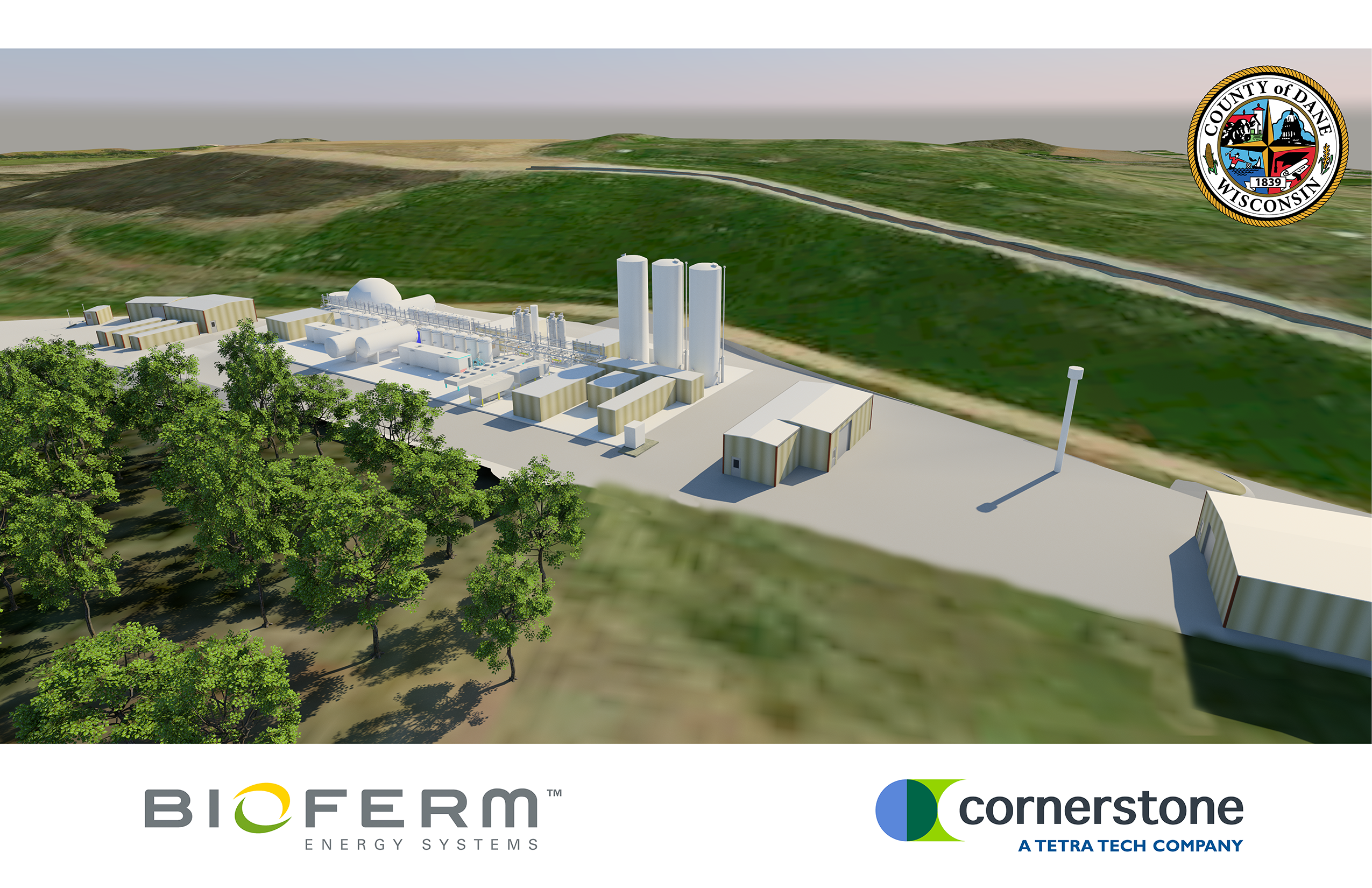
Dane County Executive Parisi Kicks Off Construction of First of its Kind Project in the Nation
Creates Economic Incentive for Development of Lakes Clean Up Efforts
Today, Dane County Executive Joe Parisi kicked off construction for an innovative project that will turn garbage and cow manure into renewable fuel for thousands of vehicles across the region and country. This project is also expected to significantly increase our lakes clean-up efforts by increasing revenue opportunities for local biogas digesters.
“Taking cow manure and garbage and turning it into vehicle fuel is good for the air we breathe, the waters we fish and swim in, and county taxpayers,” Parisi said. “Dane County is committed to accelerating work to clean up our lakes and financing efforts to produce renewable energy, and this project does both.”
Design work of the new facility is complete, BIOFerm has started ordering its system components, and the remainder of the project is out for bid now. Construction is expected to begin in the coming weeks with the system online by spring of 2019.
Dane County announced this today at a press conference with project partners Cornerstone Engineering, Clean Fuel Partners and Bioferm Energy, who is designing and supplying the biogas cleaning system for the project.
“BIOFerm is honored to be building this amazing green project for the County landfill which will serve as a beacon for all municipalities on how to maximize resources,” said Nadeem Afghan from BIOFerm. “We are proud to be a local company working to deliver this project and creating great economic value and jobs in the process. This project once completed will have the capability to deliver ½ billion gallons of clean transportation fuel which would be a great contribution by Dane County to save our environment from fossil fuel economy.”
The Dane County landfill currently generates electricity with the gas collected from the breakdown of garbage and organic material. Presently, the landfill makes enough electricity to power 4,500 homes. This new facility will enable the County to convert its landfill gas into vehicle fuel, thereby eliminating thousands of tons of carbon emissions, a leading cause to the extreme weather events triggered by climate change. In addition to the project’s environmental benefits, it is estimated the county will generate enough revenue from the project to payback its $25 million cost of the project in just a few years. That creates economic opportunity for both Dane County taxpayers and owners of “Cow Power” facilities north of Lake Mendota to convert their operations to gas production.
The County’s 2018 budget included the final phase of funding totaling $23.5 million for Dane County to build a biogas processing facility at its landfill and connect it with an adjacent interstate pipeline. That facility will clean up all of the collected landfill gas and turn it into renewable vehicle fuel. Of the total $23.5 million cost, $5.5 million is new funds in the 2018 budget. Those additional funds will allow the county to build a gas off-loading station where other biogas producers, like dairy digesters located in the North Mendota watershed, can bring their cleaned up fuel and have it injected into the pipeline. The gas would first need to be purified and compressed by the owner’s equipment before being hauled to the landfill for injection into the interstate pipeline.
This Dane County project is the first in the nation to be able to receive biogas from multiple off-site locations and connect that renewable gas with CNG gas stations locally and across the nation.
The 2018 county budget also included a $200,000 study to look into where additional digesters could be located to process manure into biogas. This will keep more manure off the land, reducing phosphorus on fields prone to runoff during heavy rain events that can get into waterways and cause algae blooms.
“Dane County continues to find game changing solutions to protect our lakes, produce renewable energy, and reduce climate change emissions,” said Jessica Niekrasz, Chief Administrator Officer of Clean Fuel Partners, whose company purchased the community digester near Waunakee in late 2015. “Our innovative private-public partnership with family-owned dairy farms will continue the work to economically remove phosphorus from the watershed.”
Digesters reduce greenhouse gas emissions by collecting and destroying methane that would otherwise be emitted to the atmosphere. They also help farms manage manure more responsibly, which reduces harmful runoff to lakes and streams. The county’s new facility at the landfill will make it economically feasible for manure digesters in the county to continue to produce renewable energy, reduce greenhouse gas emissions, and clean up our lakes.
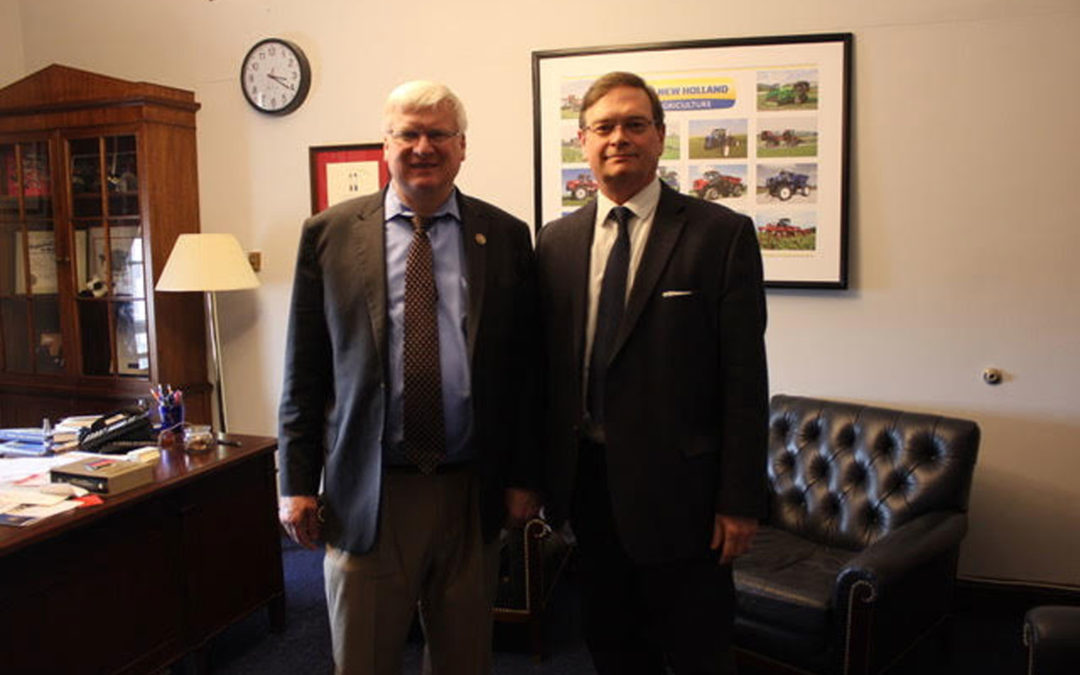
by Jim Boullion | Mar 27, 2018 | Advocacy, Biogas, RENEW Wisconsin
I had a great visit to Washington, DC the week of March 12th for a conference on Energy Policy hosted by the American Council on Renewable Energy (ACORE). While there, I also made time to visit Wisconsin’s congressional delegation. I was able to give our elected officials the latest information on the exciting growth of renewable energy in the last few years and the even faster growth that we expect renewables to experience in the future, especially in Wisconsin.
The ACORE Policy Summit was a great opportunity for me to learn about the renewable energy issues happening in Washington and around the country. Speakers included Senators Maria Cantwell (D-Washington) and Lisa Murkowski (R-Alaska), FERC Commissioner Robert Powelson, and Department of Energy Under Secretary Mark Menezes. I also met with many trade association leaders representing renewable energy such as the Solar Energy Industries Association (SEIA) and American Wind Energy Association (AWEA) as well as corporations who are leaders in the use of renewable energy and energy efficiency such as Amazon.
Among the hot topics I discussed with the congressional offices were the federal Omnibus spending bill and the significant cuts that were proposed to the Department of Energy in their renewable energy budget and funding for the Advanced Research Projects Agency-Energy (ARPA-e). (In the final Omnibus Bill deal signed by the President on March 22nd, congress not only restored the budgets of both programs, but increased them significantly!).
While visiting, I also thanked the following members of the Wisconsin delegation who signed a letter encouraging the EPA to approve applications for biogas-based electricity to qualify as a renewable fuel under the Renewable Fuel Standard program: Congressmen Mark Pocan (D-2nd), Ron Kind (D-3rd), Glenn Grothman (R-6th), Sean Duffy (R-7th) and Mike Gallagher (R-8th). This “electric pathway” would greatly assist many Wisconsin farmers to continue responsibly managing their manure and preventing runoff and ground water issues while creating renewable energy. Senator Tammy Baldwin is working hard to put together a Senate version of this letter to the EPA and I would encourage everyone to contact Senator Ron Johnson and encourage him to sign onto the letter as well.
Overall, it was a very productive and educational trip! The overriding theme that came out of the trip is that renewable energy is just now hitting its stride. It is going to get even less expensive, more reliable, grow faster and become an even more important component of the US and world energy mix!
The image above shows me with Congressman Glenn Grothman following our meeting.



